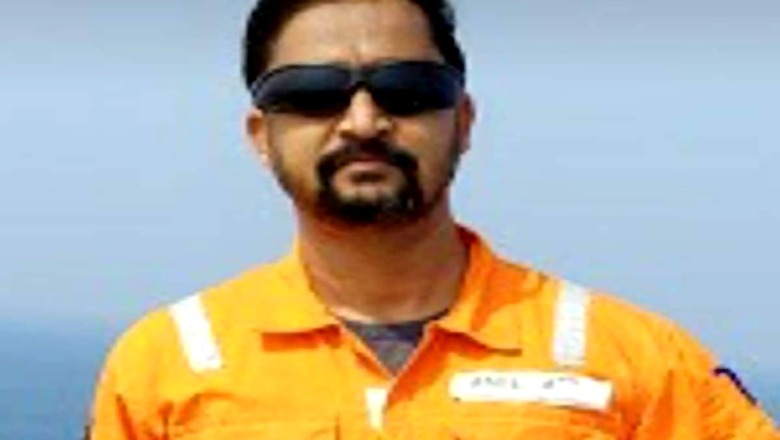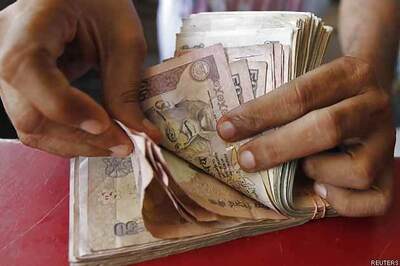
views
For nine hours, Anil Waychal’s hopes flickered in the dark, angry sea, battling roaring waves to stay afloat in a vastness of adversity.
Waychal latched on to the courage he found burning within himself in the middle of an incensed nature, which never stopped conspiring against him. Every now and then, a wave would lash him with tremendous ferocity, making Waychal think that this was the end of him.
But it was not. He survived miraculously, unlike his colleagues who drowned before his eyes.
Waychal, a 40-year-old mechanical engineer with Afcons Infrastructure, was rescued by the Indian Navy’s INS Kochi warship after nine hours in the salty waters of the Arabian Sea.
The resident of Maharashtra’s Kumbhargaon village was among the lucky ones that survived the sinking of barge P305, as Cyclone Tauktae battered India’s west coast. The barge was operated by Afcons, a contractor working on Oil and Natural Gas Corporation (ONGC) fields off Mumbai. Of the 261 people on board, 24 are still missing, while 51 bodies have been recovered.
“Nine hours felt like a lifetime. I didn’t think I would be able to meet my family,” Waychal told News18 over the phone.
But that was not the only thought that crossed his mind in the never-ending 540 minutes, when a gush of contradictory feelings rushed through his tired veins. Among them was hope. And an indomitable will to live.
“I had this inner feeling that I would be able to survive. I even tried motivating my colleagues, saying we had to survive and all of us had to return to our families,” he said the next moment.
“I didn’t know where I got this energy from. I am a sensitive person. If something happens at home, I find hard to maintain composure,” Wayachal said in Hindi, detailing his extraordinary story of survival.
He and his colleagues were on the barge on May 17, the day a ferocious storm hit P305 around 2am. With their vessel sinking, Waychal and others had no option but to jump into the sea around 5pm. INS Kochi saved him around 2am on May 18.
Waychal recalled him and his colleagues jumping into the sea in groups. “The bigger the group, the greater the chances of survival, of being rescued,” he said.
For the life jackets they were wearing glowed in the dark. It meant if survivors huddled together, there would be multiple tiny dots of light in one particular area in the darkness of the sea — which could guide rescuers towards them.
But retaining such a formation was not easy.
“We formed groups of two-three members and were floating with the waves, holding each other’s hands…We would spot another group, but the next moment it would have disappeared because of the strong currents,” he said.
“Often, the waves were seven-eight metres high. As they lashed us, we got separated. Again, we formed groups,” he said. “In these nine hours, I joined some three-four groups…And then there were periods when it was just me.”
As darkness descended, the survivors in the sea could see nothing but the lights atop rescue ships and those in their life jackets; the latter a symbol of flickering hopes among those who were still breathing.
“(But) every time the (big) waves struck, we would end up with water in our eyes and mouth. It was impossible to see…,” Waychal said.
“I had one thing clear in my mind: I can’t breathe from my nose and let water enter my lungs. I breathed from my mouth. I knew if the water entered my stomach, it wouldn’t be much of a problem. Once the navy arrived, I was confident that they would rescue me,” he said.
But Waychal stumbled upon fresh challenges just before being rescued.
“I was not sure if I would be able to climb the rescue ship. The weather was so rough. Plus, you wouldn’t have energy in your body to climb the net lowered by rescuers after such a long time in the sea,” he said.
Waychal said some of his colleagues, who were still missing, had come close to the rescue vessel, but they could not climb the net and drifted into the darkness.
“It is a huge vessel. Of course, it can’t take sharp turns the way vehicles take on roads,” Waychal said, underscoring the challenges in the final leg of the rescue mission.
He said he reached the vessel thrice — his first two attempts were a failure — and had to be finally dragged up by rescuers because he had no strength left to scale the height of the warship.
“I was not in a condition to climb. I somehow latched on to the net. I told the rescuers, ‘Please pull me up’,” he recalled.
Waychal thanked the almighty that he was able to return to his wife and two children — a son and a daughter — while he mourned his friends and colleagues lost in the sea. “I had 13 friends…Six of us have returned. Some have been found dead; others are missing,” he said.
“For a lifetime, I will remember my colleagues I shared my food with, I had chats with…I am fortunate that I returned because of my family’s prayers and God’s blessings. But what will I tell those families (whose loved ones did not return)? I can understand what they are going through. I pray to God to give them strength,” Waychal said in a heavy voice.
Read all the Latest News, Breaking News and Coronavirus News here. Follow us on Facebook, Twitter and Telegram.

















Comments
0 comment